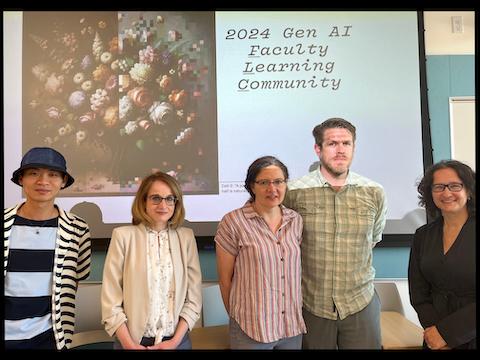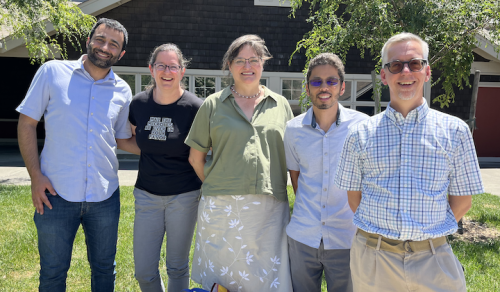Learning Communities
Learning Communities are diverse, interdisciplinary groups of faculty who come together to enhance their instructional approaches, investigate instructional change, and share their experience in employing equity focused and research-based strategies in their teaching. CEE offers three faculty learning communities: Generative Artificial Intelligence (GenAI), Engaged Learning and Teaching, and First-Generation. Each community participates in an exploration of topics central to pedagogy in higher education with the aim of developing a deeper understanding of their own teaching practice, while engaging in activities that provide a foundation for becoming educational innovators.
- The Engaged Learning and Teaching Community (ELTC) will provide support for pre-tenure faculty members who seek to build and enhance their instructional abilities and teaching skills, share pedagogical successes and challenges, and establish a foundation for research-based teaching. Topics will focus on shared issues and the resources that will support their instructional efforts.
- The First-Generation Learning Community (FGLC) seeks to foster connection and community among first-gen faculty, defined as faculty whose parents or guardians did not complete four-year college degrees. The group will discuss issues related to first-generation students and their learning needs and explore how to support first-generation faculty in their teaching and research. Dr. Jeanette Ruiz (Associate Professor of Communication) will co-facilitate the FG FLC. The First-Generation Faculty Learning Community builds on the First Gen Initiative at UC Davis and in the UC System.
- The GenAI Learning Community will provide a space for faculty to discuss questions and issues around the emerging field of teaching with generative artificial intelligence. The group will explore and evaluate possible uses of AI-based tools like ChatGPT in their teaching, as well as investigate, generate and share strategies for promoting academic integrity and critical thinking around the use of GenAI for learning.
Overview
Learning communities are designed to bring together instructors from a number of disciplines to explore topics and themes around learning and teaching. The community provides a supportive environment where members can engage in a variety of activities and experiment with new approaches to teaching, share successes and challenges, engage in pedagogical projects, and dissemination of instructional practices and tools.
As the learning community progresses, members will support each other in the completion of individual projects relating to the theme of the community and their own teaching interests and trajectory.
Topics:
The Engaged Learning and Teaching Community (ELTC) explores the question “How does learning work?” and covers topics related to student preparedness, motivation, class climate, the role of feedback, and ways students develop mastery to ultimately become self-directed learners. Sample topics include:
- Motivating Students
- Fostering Inclusivity
- Assessing Learning
- Promoting Critical Thinking
- Integrating Technology
The First-Generation Faculty Learning Community (FG FLC) focuses on issues related to navigating the academy as a first-generation faculty-member and the role of first generation faculty members in providing equitable learning environments for current and future first-generation students. Sample topics include:
- Addressing Imposter Syndrome (as educators and scholars)
- Sharing first generation stories and experiences as first-gen faculty members
- Pathways to higher education (and beyond) for first-generation students
- Fostering community and social integration for first-generation students
- Strategies to promote academic engagement and success for first generation students
The GenAI Learning Community will provide a space for faculty to discuss questions and issues around the emerging field of teaching with generative artificial intelligence. Sample topics include:
- A "Humans in the Loop" approach to GenAI
- Promoting academic integrity in an era of GenAI
- Writing effective prompts for GenAI
- Evaluating GenAI-based assignments
- Promoting critical thinking around GenAI
Benefits
You will become a member of a community of peers with shared interests in learning, teaching, and scholarship at UC Davis. The community is an inclusive space where members exchange experiences, ideas and strategies about teaching; experiment with research-based practices; build skills; and reflect on their roles as educators. You will also interact with colleagues with shared interests and specific pedagogical issues and questions.
Learning outcomes and intended impacts
Learning Community participants will:
- Integrate research-based, learner-centered, inclusive pedagogical practices into their teaching practice. Related activities include: actively preparing and participating in Learning Community meetings (meetings will likely occur bi-weekly). Review and revise course materials (e.g., syllabi, learning outcomes, and class activities).
- Leverage collaborative relationships with cross- and interdisciplinary colleagues on topics related to learner-centered instructional innovation and success. Related activities include: sharing experiences, successes, and challenges with peers in Learning Community meetings. Providing feedback on observations and/or research design and implementation.
- Articulate the process for the development of skills for reflective teaching. Related activities include: writing reflections on the impact of participation in the Learning Community; undergoing a Mid-Quarter Inquiry (MQI).
- Disseminate practices and scholarship to the broader teaching community at and beyond UC Davis. Related activities include: sharing work by providing a presentation, instructional resource materials (e.g., a classroom activity), and/or publication of findings at a UC Davis event and/or external venues.
Eligibility
Any full-time member of the Academic Senate at UC Davis may apply. Priority will be given to those hired since July 2022 for the ELTC community. The FGLC is open to any full-time members of the faculty at UC Davis who are first-generation college graduates.
A letter of support is required with every application. Check back for an updated letter template.
Contact
Learning communities program lead: Patricia Turner, Ph.D., pturner@ucdavis.edu.
- FAQs
What are the requirements of Learning Community members?
1) Actively prepare for, attend, and participate in all meetings (Learning Communities will likely meet bi-weekly; the schedule will be set prior to or during the kickoff meeting based on participant availability).
2) Share their work with a larger audience (either at UC Davis or at an external venue) by selecting one or more of the following options (likely during Fall terms):
• Present on their learning community experience or classroom innovation (e.g., at a teaching event, First-Gen forum, or symposium);
• Provide instructional resource materials (e.g., an instructional tool or teaching strategy) on a topic of significance for the larger teaching community at UC Davis);
• Publish their findings (e.g., in a teaching portfolio or as a white paper).
3) Undergo a Mid-Quarter Inquiry (MQI within one year of their Learning Community experience
4) Complete an individual project relating to the theme of the community and in alignment with their own teaching interests and trajectory.
5) Submit a reflective analysis of their participation in the Learning Community.
6) Complete a short survey providing feedback about their experience in the Learning Community at the end of their participation in the Community.
What is the time commitment?
On average, members may spend five to ten hours per month on Learning Community activities (e.g., participating in discussions, reading), including the Learning Community meeting(s). The number of hours spent on Learning Community activities will vary for individual participants and by learning community.
What is the format of the Learning Community meetings?Each Learning Community will meet for 8-10 sessions (approximately 1-2 times a month). CEE staff will help facilitate meetings. Below is a general description of the meeting format and activities:
Meetings are held bi-weekly for 60-75 minutes. Meetings are arranged based on participants’ schedules. Each community will determine the time/location of the monthly sessions during the “Kickoff” meeting. Meeting activities: Meetings feature activities designed to promote participants' active engagement in pedagogical topics. Examples include leading discussions of the focus books, reviewing scholarly articles, providing feedback one another’s ongoing projects, engaging in group activities, and interacting with experienced faculty and campus leaders.
- 2024 Cohort
Engaged Learning and Teaching Community: Whitney Duim, Chemistry, Maria Maldonado, Plant Biology, Marshall McMunn, Entomology and Nematology, Laura Vidal Chiesa, University Writing Program

GenAI Learning Community: Korana Burke, Mathematics, Juliana de Moura Bell, Biological and Agricultural Engineering/Food Science and Technology, Sara Dye, Plant Pathology, Mark Verbitsky, Political Science, Xianglong Wang, Biomedical Engineering

GenAI Learning Community: Noli Brazil, Human Ecology, Victoria Cross, Psychology, Miriam E Markum, Microbiology and Molecular Genetics, Amir Saeidi, Materials Science and Engineering, Carl Whithaus, University Writing Program. Not pictured: Heather Hether, Communication, Soojong Kim, Communication
- Past Cohorts
2023
First-Gen Faculty Learning Community: Rebekka Anderson, University Writing Program, Glaucia Carvalho do Prado, Chemical Engineering, Jorge Rodrigues, Land Air and Water Resources, Cheemeng Tan, BioMedical Engineering
PCI Diversity, Equity, and Inclusion Learning Community: Julia Chamberlain, Chemistry, Kathleen Cruz, Classics, Sara Dye, Plant Pathology, Rob Furrow, Wildlife Fish and Conservation Biology, Irene Joe, School of Law, Bwalya Lungu, Food Science and Technology, Hannah Minter Anderson, Human Ecology, Ali Moghimi, Biological and Agricultural Engineering, Xianglong Wang, Biomedical Engineering2022
Engaged Learning and Teaching Community: Lucas Smith, Neurobiology, Physiology, and Behavior, Tiffany Lowe-Power, Plant Pathology, Glaucia Carvalho do Prado, Chemical Engineering, Md Shamim Ahamed, Biological & Agricultural Engineering, Zahra Sadeghizadeh, Mechanical and Aerospace Engineering
Anti-Racist Pedagogy Faculty Learning Community: Debbie Fetter, Nutrition, Laci Gerhart, Biological Sciences, Claudia Sánchez Gutiérrez, Spanish and Portuguese, Gregory Patterson Downs, History, Lee Martin, Education2021
Engaged Learning and Teaching Community: Maria Chondronikola, Nutrition, Kathleen Cruz, Classics, Sara Dye, Plant Pathology, Ali Moghimi, Biological & Agricultural Engineering, Jaroslav Trnka, Physics and Astronomy
First-Gen Faculty Learning Community: Eleftheria Arapoglou, American Studies, Robert Bayley, Linguistics, Erin Gray, English, Jeanette Ruiz, Faculty Lead for First Gen Initiatives, Communication, Emily C Vázquez Enríquez, Spanish & Portuguese2020
Engaged Learning and Teaching Community: Ga Young Chung, Asian America Studies, Xiaoli Dong, Environmental Science and Policy, Debbie Fetter, Nutrition, Rucha Joshi, Biomedical Engineering, Emily Merchant, Science and Technology Studies, Faheemah Mustafaa, School of Education, Cameron Pittelkow, Plant Science, Wang Liao, Communication
First-Gen Faculty Learning Community: Mona Monfared, Molecular and Cellular Biology, William Sewell, University Writing Program, Joseph Sorensen, East Asian Languages and Cultures, Cecilia Tsu, History2019
Engaged Learning and Teaching Community: Julia Chamberlain, Chemistry, Po-Yen Chou, Veterinary Surgical and Radiological Science, Maureen Kinyua, Civil and Environmental Engineering, Alexander Nord, Center for Neuroscience, Luxin Wang, Food Science and Technology
First-Gen Faculty Learning Community: Louise Berben, Chemistry, Elizabeth Montano, School of Education, Sascha Nicklisch, Department of Environmental Toxicology, Lisa Pruitt, School of Law, Eduardo Silva, Biomedical Engineering
Scholarship of Teaching and Learning Community: Joseph Anistranski, Human Ecology, Silvia Carrasco Garcia, Molecular and Cellular Biology, Amanda Crump, Plant Sciences, Debbie Fetter, Nutrition, Jason White, Chemical Engineering2018
Engaged Learning and Teaching Community: Geoffrey Attardo, Entomology & Nematology, Clare Cannon, Human Ecology, Gerardo Con Diaz, Science and Technology Studies, Heather Hether, Communication
Scholarship of Teaching and Learning Community: Julia Chamberlain, Chemistry, Victoria Cross, Psychology, Susan Gentry, Materials Science and Engineering, Amy McLean, Animal Science, Mona Monfared, Molecular and Cellular Biology, Jennifer Mullin, Biological and Agricultural Engineering, Hooman Rashtian, Electrical and Computer Engineering, Mark Verbitsky, Political Science2017
Engaged Learning and Teaching Community: Juliana Leite Nobrega de Moura Bell, Food Science and Technology, Gerardo Mackenzie, Department of Nutrition, Thomas Maiorana, Department of Design, Steven Sadro, Environmental Science and Policy, Claudia Sanchez-Gutierrez, Department of Spanish and Portuguese, Alexandra Sofroniew, Art History, Ameer Taha, Food Science and Technology, Rachel Vannette, Department of Entomology & Nematology, Mark Verbitsky, Political Science, Katerina Ziotopoulou, Civil and Environmental Engineering
Scholarship of Teaching and Learning Community: Colleen Bronner, Civil and Environmental Engineering, Victoria Cross, Department of Psychology, Marina Crowder, Molecular and Cellular Biology, Heather J. Hether, Department of Communication, Bwalya Lungu, Food Science and Technology, Jeanette Ruiz, Department of Communication2016
Engaged Learning and Teaching Community: Catherine Brinkley, Human Ecology, Marcela Cuellar, Education, Mark Huising, Neurobiology, Physiology & Behavior, Kristin Kiesel, Agricultural and Resource Economics, Helen Koo, Design, Bret McNabb, Population Health and Reproduction, Linn Normand, Student Academic Success Center, Cindy Shen, Communication, Eduardo Silva, Biomedical Engineering, Chris Smith, Sociology, Stefan Hoesel-Uhlig, Comparative Literature
Scholarship of Teaching and Learning Community: Natalia Caporale, Neurobiology, Physiology, and Behavior, Julia Chamberlain, Chemistry, Jennifer Choi, Biomedical Engineering, Marina Crowder, Molecular and Cellular Biology, Ozcan Gulacar, Chemistry, Miriam Martin, Microbiology and Molecular Genetics, Mona Monfared, Molecular and Cellular Biology, Derek Stimel, Economics, Talitha van der Meulen, Neurobiology, Physiology & Behavior

